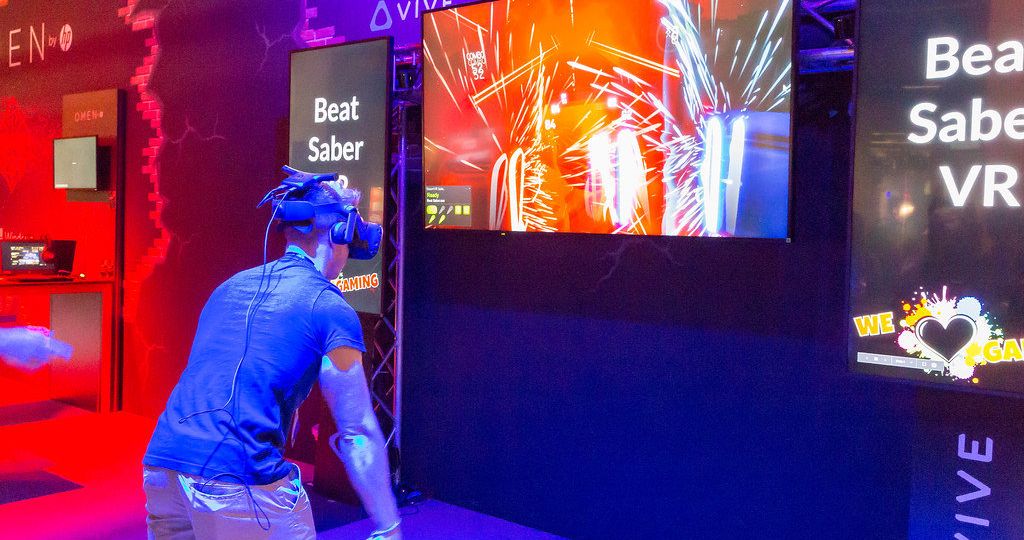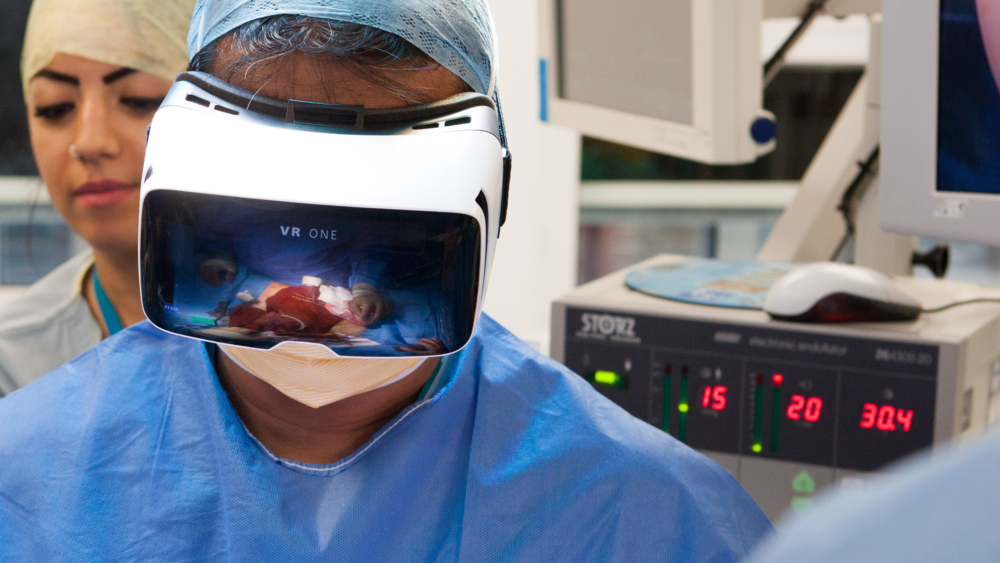
Virtual Reality gaming has been around in various forms (some more successful than others!) for quite some time. We’ve come a long way from Nintendo’s widely derided Virtual Boy in 1995, to today. Nowadays there are hundreds of genuinely clever, immersive and often beautiful Virtual Reality games existing across several platforms. There is still a perception in some quarters that VR is an application that is mainly suited to gaming, and that VR headsets are a kind of “boys toy” for big boys with more money than sense! In fact, this ignores the potential of the non-gaming applications of VR.
It’s relatively well known that VR has been used in pilot training (both military and commercial) for decades. But that is just one application. VR has been steadily making inroads as a tool for business. VR (and and also AR) are deployed in many non-gaming scenarios from training in both industrial processes and soft skills such as customer service, to aiding architects in creating immersive blueprints, assisting healthcare professionals in complex surgical procedures, and facilitating remote collaboration in real-time. It’s also used for data visualisation in sectors like finance and market research, and for creating realistic simulations for emergency response training in the security and safety sectors. It’s also being used in the retail industry for virtual shopping experiences, and in the tourism industry for virtual tours, demonstrating the incredible versatility of VR technology.
VR’s Transition into Training & Education
As VR technology matured, it didn’t take long for its potential in training and education to be realised. Unlike traditional learning methods that often rely on reading materials or lectures, VR offers an interactive, immersive learning experience that can significantly enhance knowledge retention and comprehension.
AVATAR ACADEMY
An innovation by Mersus Technologies, AVATAR ACADEMY is a virtual reality platform specifically designed for immersive, interactive training scenarios. It provides a realistic and engaging learning environment that transforms the way companies conduct their training. With AVATAR ACADEMY, trainees can experience firsthand a wide variety of situations and scenarios, making learning more effective and memorable. This platform illustrates the potential of VR beyond gaming, showcasing its effectiveness in revolutionising the traditional approach to education and corporate training.
In the educational setting, VR can bring a unique perspective to classroom learning. Imagine a history class where students can virtually walk through ancient Rome or a science class where they can interact with molecules. Or a manufacturing engineering class where students can virtually walk through a state-of-the-art factory or production facility. Students studying industrial robotics could be exposed to virtual simulations of assembly lines, where they can program and control robotic arms to perform specific tasks. They could experiment with different algorithms and see the immediate results, gaining hands-on experience in robotics and automation. These immersive experiences can make learning much more engaging and memorable, transforming the traditional approach to teaching.
One of the great things about using VR in education and training settings is that it gives us the genuine opportunity to fundamentally change the way in which the learning material is presented. Education and training professionals are well aware that a one-size-fits-all approach does not work for all learners. With VR as one of the tools at their disposal, educators can make their material more accessible, tailor it to the individual learner, and allow for users to access the materials at their own pace. VR’s accessibility and scalability make it an appealing tool for remote learning, a trend that has become even more significant given recent global events. With VR, a high-quality, interactive education can be accessible to anyone, regardless of their location.
Mersus Technologies’ own experience of working with clients who we produce educational and training apps for is that they always report a reduction in training times and better retention rates. We have also received feedback that our VR training apps resonate with a wide variety of learners, including neurodiverse people.
VR in Healthcare & Medical Training
Healthcare is another sector where VR technology has found significant application. VR has made it possible for medical practitioners to simulate complex surgical procedures for training purposes without the need for a real patient. This not only reduces risk but also enables a more immersive and effective learning experience.
For example, future surgeons can use VR to practise intricate operations in a consequence-free environment, mastering their techniques before ever touching a live patient. This kind of hands-on experience can drastically enhance their proficiency and confidence.

In the field of biopharma, VR provides the opportunity to visualise complex biological processes and drug interactions at a molecular level, enhancing understanding and aiding the design of new treatments. The AVATAR ACADEMY platform has been utilised in many ways by companies representing Ireland’s thriving biopharma sector. Training in high value processes where materials and mistakes are extremely costly is one obvious – and popular – use of VR in this sector.
One remarkable strength of AVATAR ACADEMY lies in its ability to facilitate the transfer of tacit knowledge. In complex biopharma processes, experienced professionals possess valuable expertise that is challenging to articulate through traditional means. VR simulations can replicate real-world scenarios, allowing seasoned practitioners to demonstrate their tacit knowledge and best practices. Novice employees can then immerse themselves in these virtual environments, observing and learning from experts’ actions, ultimately bridging the gap between theoretical training and practical application.
Moreover, high volume training is an ideal match for AVATAR ACADEMY in the biopharma industry. With the growing demand for skilled personnel in this sector, the ability to train a large number of individuals efficiently and effectively is paramount. VR training provides a standardised and scalable approach, ensuring that all trainees experience consistent, high-quality instruction. Additionally, learners can practise their skills repeatedly in the virtual realm without the constraints of limited resources or time, further reinforcing their proficiency.
These are just a few of the many ways in which VR is revolutionising healthcare and medical training, with countless more possibilities waiting to be explored. As technology continues to advance, we can expect the applications of VR in healthcare to become more diverse and more effective.
VR in Industrial & Technical Training
The industrial sector is another area where VR technology has become an invaluable asset. Aviation, manufacturing, and energy are industries where creating real-life scenarios for training can be costly, hazardous, or simply impractical. VR provides a solution to these issues by simulating these environments in a safe and controlled manner.
For instance, in the aviation industry, pilots can use VR to practise flight simulations, emergency procedures, and navigate through various weather conditions, all from the safety of a virtual cockpit. This not only enhances pilots’ skills but also their preparedness for real-life situations.
In the realm of manufacturing, VR can recreate factory settings, allowing workers to learn and familiarise themselves with complex machinery and equipment without any risk. By practising in a virtual factory, they can effectively learn to prevent or manage potential malfunctions, therefore improving overall safety and efficiency on the actual production floor.
Within the energy sector, especially in fields like oil and gas, VR can simulate high-risk situations such as fires or equipment failures, equipping workers with the necessary skills to manage these scenarios effectively, should they occur in reality. We in Mersus expect that Ireland’s growing wind energy sector will benefit from utilising VR for training in the installation and maintenance of turbines and other power infrastructure, particularly in the planned offshore facilities.
Virtual reality is a compelling tool in industrial and technical training, enabling learners to gain hands-on experience and improve their skills in a risk-free, cost-effective, and highly engaging manner. As VR technology continues to evolve, its impact on industrial training is set to become even more pronounced.

VR in Soft Skills & Customer Service Training
Venturing beyond the technical realms, VR also has significant applications in the domain of soft skills and customer service training. By creating interactive and immersive environments, VR technology offers a unique opportunity to enhance a variety of soft skills, including communication, teamwork, leadership, and emotional intelligence.
For example, VR can simulate challenging interpersonal scenarios, allowing employees to practise and refine their communication and problem-solving skills in a risk-free environment. These can range from managing conflicts within a team to negotiating with clients or dealing with difficult customers. This interactive approach makes the learning experience more engaging and memorable, thereby improving the retention of these essential skills.
In the context of customer service, VR takes training to a whole new level. Trainees can be placed in virtual environments that mimic real-world customer interactions, dealing with a wide range of scenarios, from handling everyday inquiries to managing difficult situations or complaints. This can significantly enhance their customer handling skills, ensuring they are better prepared for real-world challenges.
Moreover, the ability of VR to evoke real emotions in a virtual context can also help to cultivate empathy – a critical attribute in customer service roles. By allowing trainees to ‘step into the shoes’ of a customer, they can gain a better understanding of their needs and perspectives, leading to more empathetic and effective customer service.
As such, the applications of VR in soft skills and customer service training are vast, offering a dynamic, immersive, and effective way to enhance these important aspects of professional development.
The Future of VR in Non-Gaming Applications
As we have seen, the non-gaming applications of VR are as vast as they are varied, transforming sectors from healthcare and education to industrial training and soft skills development. But this is just the beginning. The VR landscape is evolving at an unprecedented pace, and as technology continues to advance, we can expect to see even more innovative uses of VR in non-gaming contexts.
So, what might the future hold? Imagine a world where VR is seamlessly integrated into our daily lives, not just in the gaming world but across all industries. Imagine virtual meetings where participants feel as though they are physically present in the same room, or a virtual marketplace where customers can try on clothes or explore products as if they were in a physical shop. The potential is truly limitless.
Moreover, recent global events have expedited digital transformation, and VR is poised to play a significant role in reshaping our post-pandemic world. Remote work and learning, telehealth services, and virtual events and conferences are likely to become the norm rather than the exception, and VR will be at the forefront of this shift.
But the key to unlocking this potential lies not just in the technology itself, but in our ability to imagine and innovate. As we move into this exciting new era of VR, we invite you to consider how the non-gaming applications of VR could transform your industry or profession. The future is closer than you think, and VR is set to play a pivotal role in shaping it. Are you ready to embrace the VR revolution?